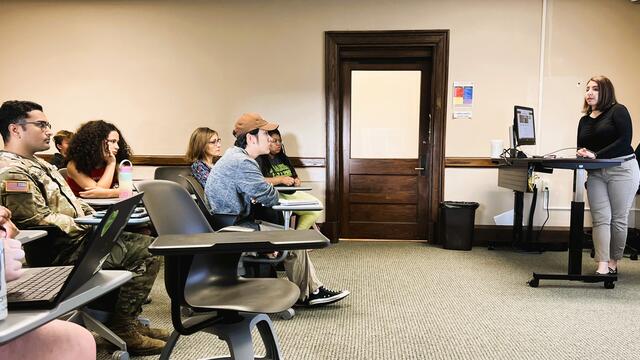Students break barriers in First Year Seminar about pop culture
First-year students in Senior Lecturer in Arabic Carol Zaru’s First Year Seminar, Breaking Barriers: Pop Culture in the Arab World, are exploring the power of pop culture through the history of the Arab Spring and in their own experiences.

Guest speaker Deena Zaru, a reporter with ABC News, visited Breaking Barriers: Pop Culture in the Arab World to speak about the influence of music.
Carol Zaru, a senior lecturer of Arabic, chose the Arab Spring and the power of pop culture as topics for her First Year Seminar (FYS) to introduce students to new cultures and invite them to think critically about a ubiquitous part of their lives.
“When we say McDaniel changes lives, we do change lives. And it’s not by teaching the content in the textbook, but by teaching students the liberal arts as part of the curriculum. And I am truly, truly passionate about that.”
The Arab Spring began in the early 2010s when people across the Arab world rallied behind protest chants (“The people want the fall of the regime!”) against oppressive government leaders and widespread impoverished socio-economic conditions. They demanded democracy.
“The power of social media helped the protestors organize protests to oust the government,” Zaru says. Digital platforms provided a place for music, videos, and word-of-mouth messaging to mobilize people to reach for change in countries where freedom of speech is highly restricted.
Beginning in Tunisia, the first wave of protests inspired others in Libya, Egypt, Yemen, Syria, and Bahrain, resulting in the deposition of multiple rulers. Pop culture played a large part in the movement by galvanizing and assembling the people of each nation.
“Something surprising I’ve learned in this class is about bravery. An individual must speak for their own rights,” says first-year student Heyaw Kassa of Baltimore.
McDaniel College’s FYS courses have high-impact, thematic curriculums that specifically support first-year students’ transition to college. The built-in First Look series introduces students to campus resources, like Hoover Library and the Center for Experience and Opportunity.
The students’ peer mentor, junior Psychology major Ashleigh Lobbins of Glen Burnie, Maryland, supports them in and out of the classroom.
“To me, being a peer mentor is using my experiences as a college student to provide the most comfortable transition for first-year students,” Lobbins says. “While other campus offices target academic, mental health, or advisory needs, my role is to simply be their motivator and supporter.”
In addition to learning about the history of the Arab Spring and modern Arabic culture, the students draw parallels to American pop culture to critically examine trends they’re seeing in their current lives.
“I am really focused on hearing their voices,” Zaru says. “It’s 15 students, so they’re all learning from each other and feeling more competent to speak out and discuss things that are affecting their lives. They are showing each other they’re not alone.”
With articles, essays, presentations, and group discussions, the students take on a variety of assignments.
“Students are truly getting an immersive experience in pop culture in the Arab world,” Lobbins says. “This course highlights the goals of an FYS by letting the students explore all different styles of learning.”
First-year student Charlotte Bradley of Frederick, Maryland, has learned that “the idea of pop culture is much larger than celebrities and social media,” she says. “Taking our knowledge of pop culture in the U.S. and applying it to the Arab world allows us to further expand our knowledge of different cultures, which I personally love.”
Guest speakers enhance the class, including John Seligman, former lecturer in Music at McDaniel, and Zaru’s daughter Deena Zaru, a journalist at ABC News covering race and culture who has had a first-hand look into pop culture activism in the Arab world.
In 2017, Deena Zaru interviewed Hamed Sinno, an openly gay Lebanese-American singer, for CNN. Sinno’s activism for LGBTQ+ rights had led to his band, Mashrou Leila, being barred from performing in several Middle Eastern countries.
“This FYS course exposes me to other aspects of the world, revolving around Arabic culture, which I have never explored before,” says first-year student Envy Lemon of Baltimore. “It helps me develop cultural competence, which is vital to my career choice of social work.”
Going above and beyond, Zaru has dedicated class sessions to talking about college life, often about topics proposed by the students. “Professor Carol has been a very warm welcome to McDaniel,” Bradley says, “and she has expressed numerous times that her door is always open to us.”
“When we say McDaniel changes lives, we do change lives,” Zaru says. “And it’s not by teaching the content in the textbook, but by teaching students the liberal arts as part of the curriculum. And I am truly, truly passionate about that.”